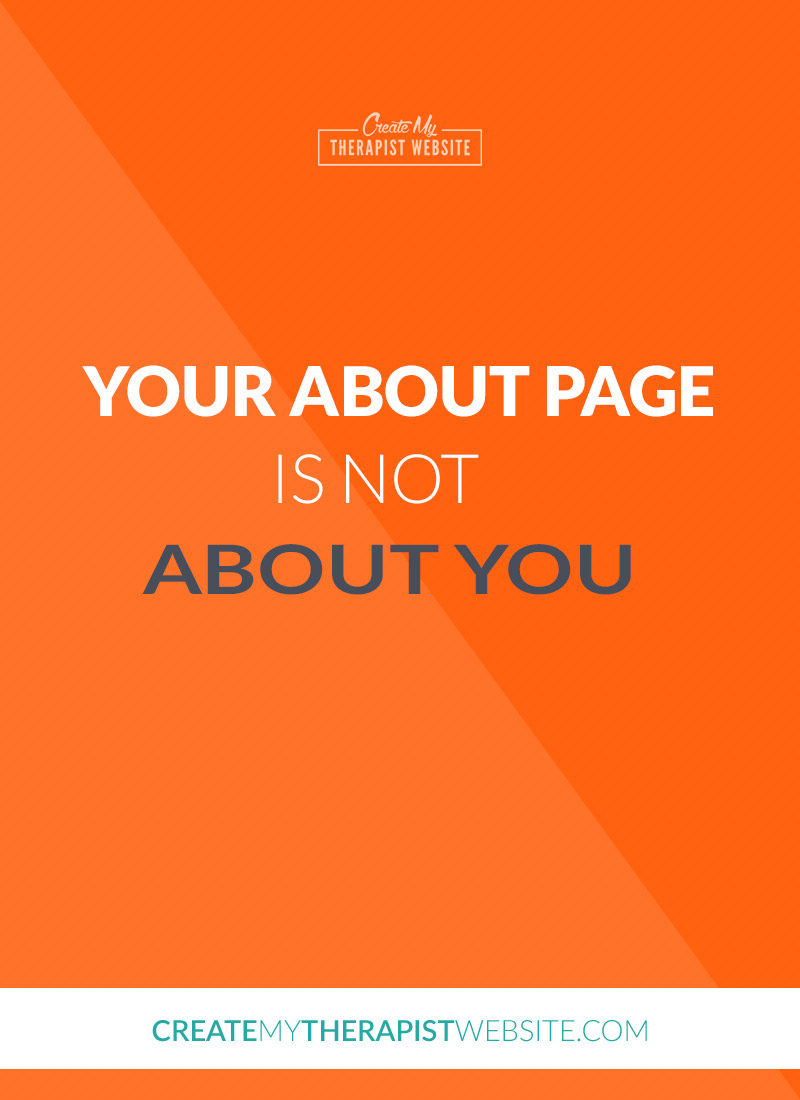As a web designer who works solely with therapists, I look at a LOT of private practice websites. As I look at these websites, I often see one specific mistake repeated over and over.
The mistake is this: When I look at your About page I have no idea what you do or who you help.
Your potential clients will leave if it’s not clear you can help them
Yesterday I visited a bike store, looking for one of those cool beach cruiser bikes for my wife.
I had a pretty good idea for what I was looking for as I stepped into a used bike shop, but would have welcomed some guidance.
As I entered, I caught a glimpse of an employee in the back room, working on repairing a bike.
He never looked up. He never greeted me. Never asked me what I needed.
So I spent 5 minutes alone, looking at what options I could see.
Nothing caught my eye, so I left. I was probably in the store for only 8 minutes.
As I got back in the car, I couldn’t help but wonder, “what would have happened had the employee asked me what I was looking for?”
What if he asked me some questions about what brought me into his bike shop, looking to help me solve my problem (wanting a new bike for my wife)?
The SAME thing happens on private practice About pages all over the internet.
We often put what we think is the best information front and center, talking about ourselves, our training and our modalities.
But what is the client looking for?
What is THEIR biggest challenge? What problem are they looking to solve?
When I stepped into that room filled with bikes, it wasn’t clear that anything there would solve my problem.
So, I bounced.
If a potential client lands on your About page and it’s not abundantly clear you can help them, chances are they’ll bounce too.
Your Client Is the Hero of the Story
One of the best books I’ve ever read about marketing a business is Donald Miller’s Building A Story Brand (affiliate link).
I can’t recommend this book enough for it’s simple, yet powerful framework for creating solid marketing materials, including a website.
This book practically breaks down how to use the structure of storytelling to market to your ideal client.
If I could, I’d have everyone in my audience read this book!
He says that the key to marketing is making your ideal client the hero of the story.
Not YOU or your private practice.
When your potential clients can picture themselves fitting into the story of your business, overcoming their greatest challenges and getting what they want in life, they will more easily do business with you.
In his book, Donald Miller suggests these 3 crucial questions to ask yourself in order to market effectively:
- What does the hero want?
- Who or what is opposing the hero getting what she wants?
- What will the hero’s life look like if she does (or does not) get what she wants?
This can directly be applied to your about page!
Instead of starting this crucial page with the headline “About Me,” begin with your client (the hero) as the focus.
What do they want more than anything RIGHT now as they’re searching for help.
What life situations, personal roadblocks or challenges are getting in the way of what they want. Why are they searching for a therapist at this time?
And then paint the picture of what life would look like once they’re able to overcome these challenges.
At this point we can turn the story toward you and your practice.
You are the guide who will help them get what they want. But before you present yourself as the solution, you must first identify with your client’s challenge.
Writing An Effective About Page for your Private Practice
So how do you actually write a great about page for your own therapy website?
Great question.
The first step is to get absolutely clear about who you serve in your private practice.
Knowing who you’re trying to reach will help you write content and know exactly how to speak and what to say.
Use the three questions above to help you craft the story of your ideal client.
Starting with where they’re at right now, your goal is to use the content of this page to guide them to their goal – a picture of what life could look like if they overcome their current challenges.
Here’s a simple outline you can use for your About page:
- A headline that clearly states who you help and what you help them achieve
- Paint a picture of their struggle – what does it feel like to be where they are right now
- Paint a picture of what life could look like if they overcame their current challenge
- Give them a plan – this is where you can explain what it looks like to work with you
- A clear call to action – have them contact you or schedule a consultation
Need some inspiration for your About page?
Check out this post: Websites for Therapists: 10 Examples of Amazing About Pages
Conclusion
Your clients will leave your website if it’s unclear that you can help them.
The goal of your About page should be to quickly and clearly inform your ideal client that you can guide them to the life that they desire.
I hope these tips will help you put your ideal client at the center of your marketing and focus your About page on them… and not you.
Doing so could mean the difference between a website visitor moving on to the next therapist, or sticking around and becoming your next client.
If you’re struggling to create an effect private practice website and you’re tired of DIY tutorials that don’t take into account the nuances of marketing for therapists then I invite you to check out The Create My Therapist Website Toolbox 2.0.
Click the banner below to get started and I’ll take you through my entire process of creating a beautiful website that attracts new clients while you’re in session.




